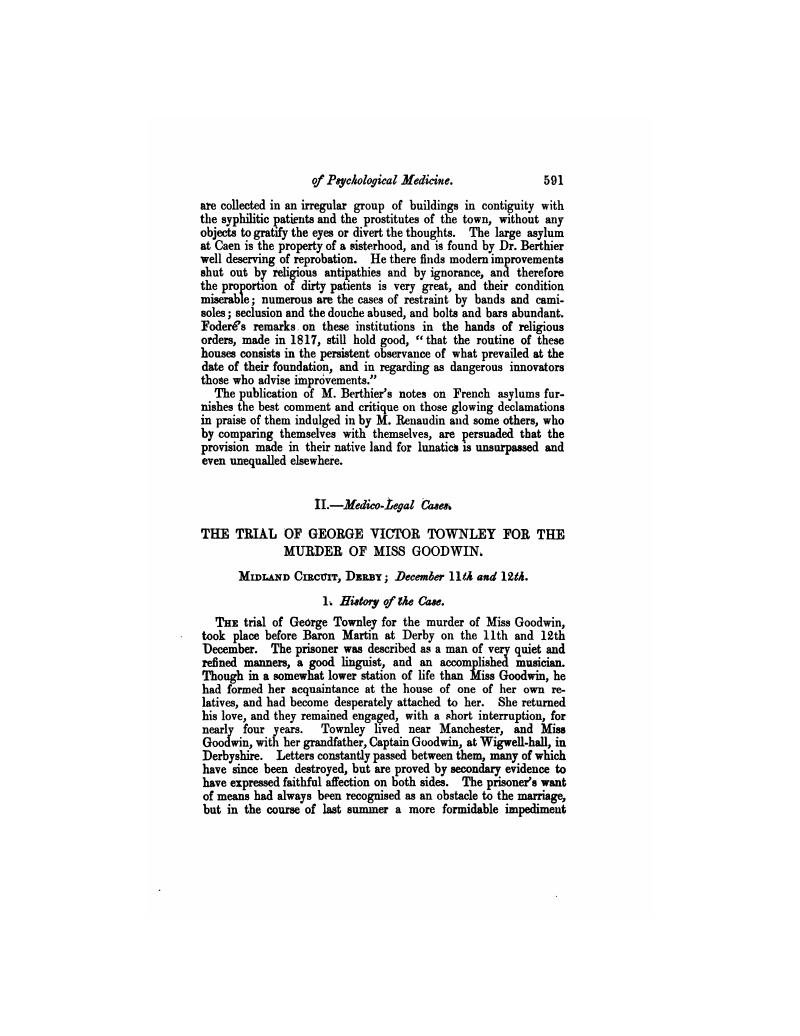Published online by Cambridge University Press: 19 February 2018

* We are indebted to the ‘Times’ (December 14th) for this clear summary of this painful case.Google Scholar
† With reference to this evidence, Dr. Forbes Winslow writes:-Google Scholar
“Sir,-May I be permitted to state, in reference to the evidence I gave at Derhy in the case of George Townley, that I pronounced no opinion as to his insanity on the 21st of August, the day he committed the murder?Google Scholar
Having, as I thought, recognised, in common with Mr. Gisborne, the surgeon to the prison, and Mr. Sims, the governor of the gaol, mental derangement on the 18th of November, and on the 10th inst., I said, in reply to a question put by Mr. Macaulay, ‘Assuming the prisoner to have been in the same state of mind on the 21st of August as he was at the time of my examination of him in the Derby County Gaol, I was of opinion that he was then (as he is now) deranged in his intel lect, and consequently legally irresponsible.’ I purposely avoided propounding any speculative opinions on the subject of his alleged insanity at the time of the murder, rigidly adhering to a statement of facts observed by myself.Google Scholar
“In the course of my analysis of Mr. Townley's state of mind, I could not altogether set aside his singularly perverted views on the subject of religion; but I carefully avoided all misconception on the subject by staling, in my written opinion, ‘that it would be most unphilosophical to infer the existence of insanity from the theological views of the prisoner or of any person.’Google Scholar
“I distinctly referred, in my evidence, to the prisoner's intellectual delusions, as contradistinguished from what may be termed his moral perversion.Google Scholar
“He informed mettiat lie killed MissGoodwinin order to ‘recover’ and ‘repossess’ himself of property that had illegally been wrested from him by an act of violence. He was perfectly unable to appreciate the absurdity of this idea.Google Scholar
“If a man were to throw a sovereign into the Thames, and, on being asked why he did it, were to reply that his object was to ‘recover’ and ‘repossess’ himself of the twenty shillings thus lost to him for ever, would he, if he persisted in this assertion, be considered of sane intellect?Google Scholar
“As an additional proof of his intellectual derangement, I referred to his insane belief in the existence of a conspiracy against him, consisting of six persons, with a chief at their head. Mr. Baron Martin, in his charge to the jury, pointedly alluded to this delusion, and remarked that it frequently existed among insane persons.Google Scholar
“I am, &c.,Google Scholar
“Forbes Winslow.”Google Scholar
“Cavendish Squar;Google Scholar
“December 16th, 1863.”Google Scholar
* December 19.Google Scholar
eLetters
No eLetters have been published for this article.